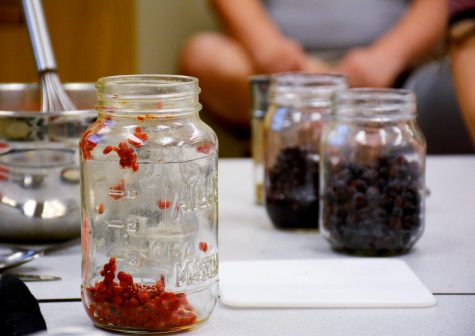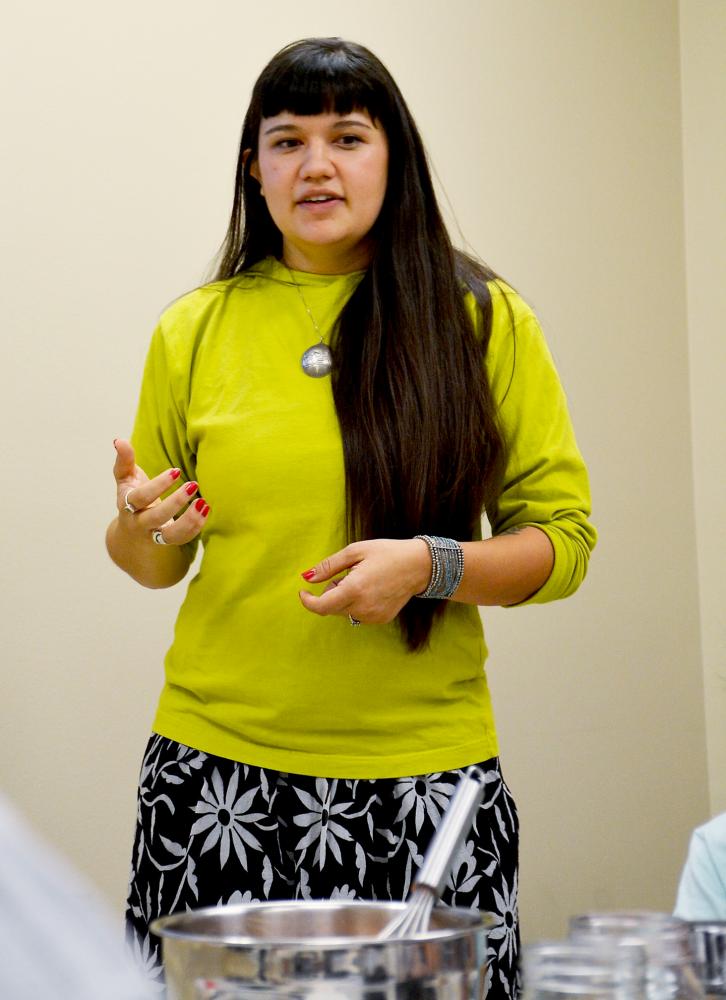Modernizing traditional cooking
Regional, traditional foods are made out of plants like moss
HARRINA HWANG | The Daily Evergreen
Emma Noyes, the Native outreach coordinator for the health sciences campus in Spokane, holds a traditional Native American foods workshop Friday in the WSU Native Center.
October 4, 2017
The WSU Native Center hosted a traditional foods workshop where students and other members of the community met to sample and learn about locally-sourced Native foods.
Emma Noyes, the Native outreach coordinator for the health sciences campus in Spokane, presented information on identifying, harvesting and preparing traditional foods from around the region and state Friday afternoon.
“Just don’t use trial and error,” Noyes said when explaining ways to identify edible plants. “That’s too much liability on me.”
Noyes has relied on family, friends, teachers, books and experimentation to learn about regional traditional foods and their health benefits.
A variety of traditional foods can be found regionally and across the state, including thimble berries, turkey, eels, sturgeon, the Indian potato, the Indian carrot, nodding onions and yellow water lilies, Noyes said.
At the workshop, samples of smoked salmon, bitterroot, serviceberries, huckleberries and moss pudding were served.
To make the moss pudding, coyote’s hair, a type of moss that grows from tall trees, is first harvested with a long, hooked stick. After the moss is cleaned and rinsed it is cooked in hot water. Honey, berries and other forms of sweeteners are often added, Noyes said.
Traditional cooking methods include the use of hearth ovens, boiling, smoking and drying foods. But good traditional food can still be made with modern methods, Noyes said.
At the workshop, participants made Indian ice cream with soapberries. Collectively, the group attending the workshop whipped the berries into a froth, then added sugar to the mixture to make a smooth ice cream.

Participants used huckleberries and serviceberries in meals.
Faith Price, the assistant director of the Native Center, attended the workshop.
“I want students to know about the Native Center,” Price said. “We’re welcome to anyone.”
The Native Center can be especially supportive to Native American students, Price said. It’s a place to connect with, learn about and experience the rich heritage of Native Americans.
In the past, the Native Center has hosted many events, including a moccasin building workshop, cedar weaving tutorials and food events. It has also hosted many speakers.
Denise Koger, a senior majoring in psychology, is a member of WSU’s Native American Women’s Association. NAWA also hosts many events and sheds light on problems Native Americans face.
Traditional diets result in better oral health and decreased chances of heart disease and cancer, Noyes said. Eating these foods is particularly important for Native Americans, she said, because death rates from cancer have increased, while rates for Caucasians has decreased.
“Relationships to food are important,” Noyes said.









